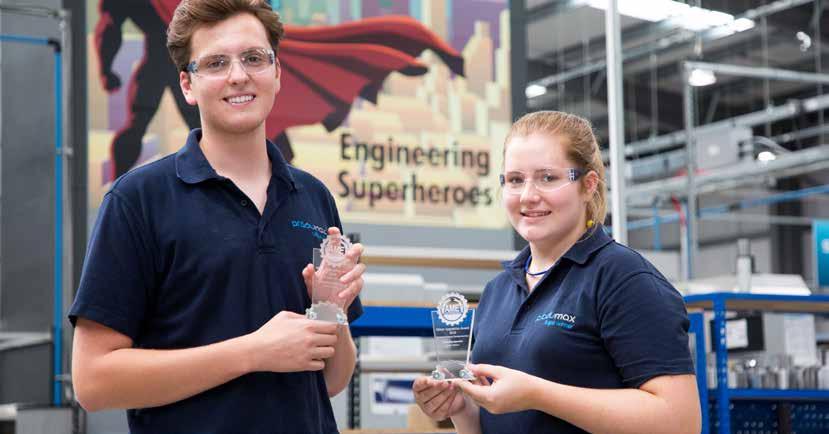
4 minute read
QUICK-WIN SUSTAINABILITY STRATEGIES FROM IFM
Insights from IfM show that not only are rapid sustainability initiatives achievable, they can also improve the bottom line.
Increasingly, sustainability is moving from a “good idea” to a necessary part of doing business. As the cost of energy and materials rise, and growing numbers of consumers put sustainable shopping and the environment high on their list of priorities, continuous improvements in sustainability can be the difference between thriving or shutting up shop.
Advertisement
Sustainability initiatives: what to do and how to do it
Through increasing energy and resource efficiency, the UK stands to gain £10 billion per year in additional profit for manufacturers (according to research from IfM). However, according to Professor Steve Evans, Director of Research in Industrial Sustainability at IfM, the manufacturing industry has some distance to go to achieve these targets.
He said: “Around 90% of the resources processed to create goods are not reaching the person for whom they are made; 50% of edible food is not eaten, and only about 50% full loading is achieved in freight trucks in the UK.
“For manufacturers, there is now a real opportunity to be proactive in recognising future challenges, taking decisive action and making the most of the opportunities that will come from a global shift toward sustainability. It’s a daunting task, but it’s one that manufacturers should – and need to –address as the sustainability imperative continues to grow.”
Having agreed to pursue sustainability, maybe even setting a specific target, for many organisations, the exact pathway remains unclear. To help manufacturers gain clarity about both “what to do” and “how to do it”, IfM established the Sustainability Association to help businesses get the support they need to progress sustainability initiatives.
“Manufacturing organisations want advice on the best place to start with sustainability initiatives,” Steve added. “They want to know the best strategy for effective returns and how to avoid common pitfalls,” Steve added.
As part of the association, members work with IfM to commission new projects in areas of mutual interest. Topics that have been identified as priority areas for the association include supply chain sustainability and Scope 3 emissions, the path to net zero and the role of digital in transforming sustainability.
The most recent project focused on how to achieve quick wins in sustainability improvements. IfM talked to practitioners from a range of global manufacturing firms, as well as sustainable manufacturing experts, to identify common success factors and best practices in businesses that had achieved consistent, rapid sustainability improvements.
Small steps lead to longer-term gains
Sustainability, when included as part of continuous improvement objectives, can act as a foundation for building a sustainability culture. However, it is also important to note that any initiatives should be part of a larger (long-term) sustainability agenda to avoid reverting to small improvements. “Even after a step change, businesses can continue to implement continuous improvements to optimise the system and seek further sustainability improvements,” said Steve. “Rapid sustainability improvements resulting from continuous improvement initiatives can create an opportunity to justify larger sustainability projects or at least provide flexibility in the company budget.”
Six sustainable actions you can take now
IfM talked to practitioners from a range of global manufacturing firms, as well as sustainable manufacturing experts, to identify common success factors and best practices in businesses that had achieved consistent, rapid sustainability improvements. The study revealed that using continuous improvement initiatives can be an excellent way to achieve rapid sustainability improvements, demonstrating that the journey towards sustainable manufacturing doesn’t have to be expensive.
1. Look at your existing resources: No organisation can improve without understanding its current condition, so it’s vital to first assess existing resources at a surface level. While identifying current waste may seem trivial, the research shows it is, in fact, very important and is the first and most vital step towards conservation.
2. Don’t wait for a full sustainability strategy: It is achievable in the short term. Set realistic targets to avoid discouragement and build confidence among employees and managers. It can help to start by holding internal discussions on priorities and focusing on wellknown issues and impact points. For example, during interviews in the study, companies highlighted opportunities to switch processes and equipment off.
3. Include sustainability KPIs: What gets measured gets improved. Monitoring metrics that align with sustainability is key to driving sustainability improvements through continuous improvement. It’s enough to start small with KPIs, selecting a few that track the current sustainability condition in a cell or facility, such as the use of electricity, water, coolant or the volume of materials waste.
4. Start small: A simple yet effective approach teams can look at straight away is to review resource variation – the difference between energy used on good days and bad days. Teams can identify ideas and processes that have already been proven to work as they have ‘been done before.
5. Get people involved: Wide engagement and commitment were found to be the most influential factors in achieving rapid improvements and a successful sustainability transformation. Quick sustainability wins can be used to seek top management buy-in by communicating their success in achieving cost savings, as well as environmental benefits.
6. Recognise effort and success: Creating a working environment that strongly recognises and rewards efforts towards sustainability improvements can help employees at all levels engage with sustainability challenges. It is critical to make employees feel important and at the heart of the improvement process.
The IfM Sustainability Association is a membership group designed to allow manufacturing leaders to work together to identify and overcome common challenges in making their operations more sustainable. In collaboration with world-leading researchers in the field and talented peers from different industries, the association provides member companies with the right knowledge, expertise and network to accelerate sustainable change in their organisation. Find out more by scanning the QR code below:








